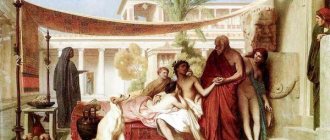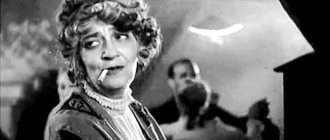Diogenes
When someone was reading a long work and an unwritten place at the end of the scroll already appeared, Diogenes exclaimed: “Courage, friends: the shore is visible!”
When Plato gave a definition that had great success: “Man is an animal with two legs, devoid of feathers,” Diogenes plucked the rooster and brought it to his school, declaring: “Here is Plato’s man!” After this, the definition was added: “And with wide nails.”
To a man who asked what time he should have breakfast, he [Diogenes] replied: “If you are rich, then when you want, if you are poor, then when you can.”
When someone hit him with a log and then shouted, “Look out!” - he [Diogenes] asked: “Do you want to hit me again?”
In broad daylight, he [Diogenes] wandered around with a lantern in his hands, explaining: “I’m looking for a man.”
To those who were afraid of bad dreams, he [Diogenes] said that they do not care about what they do during the day, but worry about what comes into their minds at night.
When someone, envious of Callisthenes, told what a luxurious life he shared with Alexander [the Great], Diogenes remarked: “He is truly unhappy who has breakfast and lunch when it pleases Alexander!”
About one dirty bathhouse, he asked: “Where should those who washed here wash?”
[Diogenes] begged for alms from the statue; when asked why he was doing this, he said: “To accustom himself to refusal.”
When asked at what age one should get married, Diogenes replied: “It’s too early for the young, it’s too late for the old.”
When his slave ran away, he was advised to go on a search. “It’s funny,” said Diogenes, “if Manet can live without Diogenes, and Diogenes cannot live without Manet.”
Asked by someone why people give to beggars but never to philosophers, Diogenes replied: “Because they assume that they can still become lame and blind, but never philosophers.”
Returning from Olympia, when asked whether there were many people there, he [Diogenes] replied: “There are many people, but few people.”
When asked where he was from, Diogenes said: “I am a citizen of the world.”
To the one who shamed him for being in unclean places, he said: “The sun also looks into garbage pits, but it does not become defiled.”
From the spendthrift he [Diogenes] asked for a whole mine; he asked why he was begging for an obol from others, but he was asking for a whole mine. “Because,” answered Diogenes, “I hope to ask others again, but whether I will have the chance to ask you again, only the gods know.”
Seeing the old woman preening, Diogenes said: “If for the living, you are late, if for the dead, hurry up.”
Seeing the gossiping women, Diogenes said: “One viper borrows poison from another.”
Teaching an old man how to treat a dead man.
One day, Diogenes, having breakfast in a tavern, called Demosthenes, who was passing by, to him. He refused. “Are you ashamed, Demosthenes, to enter a tavern? - Diogenes asked, “but your master is here every day!” – meaning the entire people and each citizen individually.
Once Diogenes, arriving in Olympia and noticing richly dressed Rhodian youths in the festive crowd, exclaimed with laughter: “This is arrogance.” The philosopher then encountered the Lacedaemonians in shabby and unkempt clothing. “This is also arrogance, but of a different kind,” he said.
When rumors spread that honorable Philip [of Macedon] was approaching, horror fell on the Corinthians, and everyone set to work: some prepared weapons, some carried stones, some repaired the wall (...). Diogenes, seeing this (...), began to diligently roll back and forth (...) the large pot in which he then lived. To the question of someone I knew: “What are you doing, Diogenes?” - he answered: “I roll my pot so that it doesn’t seem like I’m the only one messing around when so many people are working.”
A certain sophist asked Diogenes: “I am not you, right?” “That’s right,” said Diogenes. "I am human". “And this is true,” said Diogenes. “Therefore, you are not a person.” “But this,” said Diogenes, “is a lie, and if you want the truth to be born, start your reasoning with me.”
Diogenes, seeing how the Olympian Dioxippus, who was riding in a chariot, increasingly turned his head back, looking at the beautiful woman looking at the procession, and unable to take his eyes off her, exclaimed: “See that the girl doesn’t break the young man’s neck!”
One day an Athenian laughed at him [Diogenes] in these words: “Why, when you praise the Lacedaemonians and blame the Athenians, do you not go to Sparta?” (...) - “Doctors usually visit the sick, not the healthy.”
Diogenes (...) ordered to be abandoned without burial. “What, to be devoured by wild beasts and vultures?” - “Not at all! – answered Diogenes. “Put a stick next to me and I will drive them away.” - “How so? Will you feel it? - “And if I don’t feel it, then what do I care about the gnawing animals?”
I'm looking for a man!
You have to live with the truth like you would live with a fire: neither get too close so as not to burn you, nor move far away so as not to feel cold.
Triumph over oneself is the crown of philosophy.
In order to live properly, you must have either a mind or a loop.
Everything is in the power of the gods; sages are friends of the gods; but friends have everything in common; therefore, everything in the world belongs to the wise.
If you give to others, then give to me; if not, then start with me.
There are many people, but few people.
Fathers and children should not wait for requests from each other, but should proactively give what each other needs, with primacy belonging to the father.
Those are more reckless than cattle who quench their thirst not with water, but with wine.
Inflicting torment on your envious people means being in a good mood.
The flatterer is the most dangerous of tame animals.
It’s good to leave this life like leaving a feast: without thirsting, but without getting drunk.
Diogenes short biography (412 - 323 BC)
Diogenes quotes.
Diogenes of Sinope - ancient Greek philosopher. Comes from a noble family. He practiced extreme asceticism, reaching the point of eccentric foolishness. He called himself a citizen of the world (“cosmopolitan”). In his youth, he was expelled from his hometown on charges of making counterfeit money. Around 385 BC arrived in Athens and became a student of the philosopher Antisthenes, founder of the Cynic school. Traveled a lot, lived for some time in Korinth. Author of 7 tragic plays and 14 ethical dialogues that have not survived to this day. The hero of numerous stories that depict him as an ascetic philosopher, spending his days in a barrel (pithos) (Diogenes lived in a barrel), a preacher of Cynic virtue - a reasonable return to natural nature, a subverter of public morality. The philosophy of Diogea, compared to Antisthenes, was more radical; he introduced the concept of cosmopolitanism, denied the need for family, laws, and preached the community of wives and children.
Works of Diogenes: “On Love”, “State” (“Polity”), “Oedipus”, “Thyestes”.
Do you need a Test, Diploma, Coursework or any other work on this topic? Order it here: Order work
Antisthenes himself - (his teacher - Note by I.L. Vikentiev) with his teaching, Diogenes often reproached him for lack of firmness and, blaming, called his teacher a battle trumpet - there is a lot of noise from it, but it does not hear itself . Antisthenes patiently listened to his reproaches, as he admired the student’s character.
Having learned that, according to Plato, a person is defined as a two-legged animal, devoid of feathers, Diogenes plucked the rooster and, bringing it to the Academy, announced: “Here is Plato’s man.” (After this, the definition was added: “And with wide nails” (in other translations a more precise sign is indicated - “with flat nails” - Note by I.L. Vikentyev)).
When Plato was expanding on his ideas and talking about “pregnancy” and “cup”, Diogenes remarked: “As for me, I see the table and the cup, but “pregnancy” and “cup” - not.” To which Plato allegedly answered him that Diogenes has eyes for the cup and the table, but for the “cup” and “pregnancy” he has no mind. (This question is not so simple - see: David Hume's skepticism - Note by I.L. Vikentiev).
Diogenes and his followers - wandering teachers of truth - preached contentment with little. Once seeing a boy drinking water from a handful, the philosopher threw his cup out of his bag, saying: “The boy has surpassed me in the simplicity of his life.”
Confirming by personal example the need to throw off the shackles of civilization, which was disfiguring people, and return to the bosom of nature, Diogenes settled in a barrel, or rather, in a large clay amphora for storing liquids, wine or grain - pithos. Believing that virtue consists in abstinence, in the absence of needs and in living in accordance with nature, he carried his asceticism to its extreme limits.
His sermons, usually in the form of a casual conversation with listeners, were most popular among the urban lower classes, and most townspeople loved the eccentric. So, for example, when some boy broke his amphora barrel, they flogged the attacker, and Diogenes was given a new barrel.
Many Cynics lived on alms, but in their poverty, following and imitating Diogenes, they were quite witty. One of them. Teles (3rd century BC), said to the rich man: “You give generously, and I accept courageously, without groveling, without losing my dignity and without grumbling.” The apt expressions of the Cynics, their witty jokes, accusatory satirical speeches, in which poetry and prose alternated, met with a lively response among the people.
Many sayings are attributed to Diogenes himself. Once, for example, when someone was reading a long essay and an unwritten passage at the end of the scroll already appeared, the philosopher exclaimed: “Courage, friends: the shore is visible!”
Once he talked about important subjects, but no one listened to him; then the philosopher began to whistle like a bird; people gathered, and Diogenes shamed them for running together for trifles, but not moving for important things.
When someone brought the philosopher to a luxurious home and did not allow him to spit, he immediately spat in the face of his companion, declaring that he had not found a worse place.
The eccentric masturbated without embarrassment in front of everyone and urinated like a dog, which caused the rejection of those around him.
Plato nicknamed him “the raging Socrates .”
Diogenes begged for alms from the statue; When asked why he was doing this, the philosopher replied: “To accustom himself to refusal.”
He asked for alms from the miser, who hesitated. “Reverend,” said Diogenes, “I am asking you for bread, not for a crypt!”
When asked why people give alms to the poor and not to philosophers, he replied: “Because they know: they may become lame and blind, but never wise.”
To a man who asked what time he should have breakfast, he replied: “If you are rich, then when you want, if you are poor, then when you can.”
When the philosopher was having breakfast in the square, onlookers crowded around him, shouting: “Dog!” “You are dogs,” said Diogenes, “because you crowd around my breakfast.”
Someone pitied Diogenes for his exile. “Unfortunate,” he replied, “after all, thanks to exile, I became a philosopher.”
When asked what philosophy gave him, the eccentric replied: “At least, readiness for any turn of fate.”
To the man who said: “I don’t care about philosophy!”, he objected: “Why do you live if you don’t care about living well?”
Theophrastus in his Megaricus says that Diogenes understood how to live in his situation when he looked at a mouse running by, which did not need bedding, was not afraid of the dark and was not looking for any imaginary pleasures. According to some reports, he was the first to fold his cloak in half, because the philosopher had to not only wear it, but also sleep on it. He carried a bag to store food in it, and every place was equally suitable for him to eat, sleep, and talk. Therefore, the philosopher used to say that the Athenians themselves took care of his home, and pointed to the portico of Zeus and Pompeion (a warehouse for utensils for ceremonial processions in the main square of the city - Note by I.L. Vikentyev).
To those who were afraid of bad dreams, Diogenes said that they do not care about what they do during the day, but worry about what comes into their minds at night.
Seeing that in Megara the sheep walked around in leather blankets, and the children ran naked, Diogenes said: “It is better to be a Megarian’s ram than his son.”
When someone hit him with a log and then shouted, “Look out!” - he asked: “Do you want to hit me again?” According to another version, the man who pushed him with a log and then shouted: “Beware!”, Diogenes first hit him with a stick and then also shouted: “Beware!”
When asked where it is better to receive blows, he answered: “On the helmet.”
They say that an eccentric wandered around in broad daylight with a lantern in his hands, explaining his actions with the words: “I’m looking for a man.”
And one day he stood naked in the rain, and those around him felt sorry for him; Plato, who witnessed this, told them: “If you want to pity him, step aside,” referring to his vanity.
According to unconfirmed reports, Diogenes had a wife, Pamphilus, and a daughter, Milena. And this despite the fact that the eccentric denied, along with wealth and honors, also science, private property, and marriage.
Seeing someone performing the rite of purification, Diogenes said: “Wretched one! You don’t understand that cleansing doesn’t correct life’s sins any more than it corrects grammatical errors.”
One day he begged for alms from a man with a bad character. “I’ll give you money if you convince me,” he said. “If I could convince you,” said Diogenes, “I would convince you to hang yourself.”
Once he was returning from Lacedaemon to Athens and when asked: “From where and to where?” - answered: “From the male half of the house to the female half.”
When asked where he was from, the eccentric said: “I am a citizen of the world.”
Someone made sacrifices, begging the gods for a son. “And for your son to be a good person, don’t you make sacrifices for this?” - Diogenes asked.
Seeing an incompetent archer, he sat down near the target itself and explained: “This is so that they don’t hit me.”
“When is the world prosperous?” - Diogenes was once asked. “When its kings philosophize and philosophers reign,” answered the sage.
If Diogenes needed money, he did not say that he would borrow it from his friends; he said that he would ask his friends to repay him. The philosopher preached: “The love of money is the measure of every vice.”
He was surprised that historians study the disasters of Odysseus, but do not know their own; musicians harmonize the strings of the lyre, but cannot cope with their own temper; astronomers watch the Sun and Moon, but do not see what is under their feet...
The philosopher returning from Olympia was asked whether there were many people there, to which he replied: “There are many people, but few people.”
A certain “jumper” said to Diogenes: “What a pity, Diogenes, that you, with such training, never participated in the Olympic competitions.” Surely you would be the first! - But I take part in competitions that are more important than the Olympic ones. - Which ones are they? — the “jumper” did not understand. And, shaking his head reproachfully, Diogenes replied: “You know: I compete in the fight against vices.”
Sklyarenko V. M., Evminova S. P., Iovleva T. V., Miroshnikova V. V., 50 famous eccentrics, Kharkov, “Folio”, 2007, pp. 168-172.
Phrases and quotes from Diogenes of Sinope, ancient Greek philosopher
Diogenes of Sinope - ancient Greek philosopher (412 BC, Sinop - June 10, 323 BC, Corinth), founder of the Cynic school, student of Antisthenes.
- I am a citizen of the world.
- Those who keep animals must recognize that they serve the animals rather than the animals serving them.
- Poverty itself paves the way to philosophy. What philosophy tries to convince in words, poverty forces us to do in practice.
- To a man who asked what time he should have breakfast, Diogenes replied: “If you are rich, then when you want, if you are poor, then when you can.”
- In order to live properly, you must have either a mind or a loop.
- I only sneeze when a speck gets into my nose, otherwise I don’t sneeze.
- Seeing the gossiping women, Diogenes said: “One viper borrows poison from another.”
- Villains obey their passions like slaves to their masters.
- When Diogenes was basking in the sun in Crania, Alexander the Great, standing over him, said: “Ask me what you want.” Diogenes replied: “Do not block the sun for me.”
- In broad daylight, Diogenes wandered around with a lantern in his hands, explaining: “I’m looking for a man.”
- When asked where he was from, Diogenes said: “I am a citizen of the world.”
- When extending your hand to friends, do not clench your fingers into a fist.
- There are many people, but few people.
- He begged for alms from the statue; When asked why he was doing this, Diogenes said: “To accustom himself to refusal.”
- Treat dignitaries like fire: do not stand either very close or very far from them.
- About one dirty bath, Diogenes asked: “Where should those who washed here wash?”
- When extending your hand to friends, do not clench your fingers into a fist.
- When asked why people give alms to the poor and not to philosophers, he said: “Because they know: they may become lame and blind, but never wise.”
- Voluptuousness is the occupation of people who are not occupied with anything else.
- When asked at what age one should get married, Diogenes replied: “It’s too early for the young, it’s too late for the old.”
- Those are more reckless than cattle who quench their thirst not with water, but with wine.
- A backbiter is the most fierce of wild animals, and a flatterer is the most dangerous of tame animals.
- Seeing the old woman preening, Diogenes said: “If for the living, you are late, if for the dead, hurry up.”
- If you give to others, give to me, if not, then start with me.
- Philosophy and medicine have made man the most intelligent of animals, fortune telling and astrology the most insane, superstition and despotism the most unfortunate.
- Diogenes, seeing how the Olympian Dioxippus, who was riding in a chariot, increasingly turned his head back, looking at the beautiful woman looking at the procession, and unable to take his eyes off her, exclaimed: “See that the girl doesn’t break the young man’s neck!”
- Returning from Olympia, when asked whether there were many people there, Diogenes replied: “There are many people, but few people.”
Philosophy of Diogenes
Diogenes came to Athens, where he met Antisthenes, but at first the latter refused to take the future philosopher as a student. But Diogenes was so persistent that Antisthenes had to agree.
Like his teacher, Diogenes believed in self-control, the importance of the personality of each person and was confident that everyone should strive for perfection in their life and behavior (virtue) and give up everything unnecessary: personal belongings, social status.
Diogenes was so hot in temperament that he preached his views in the markets in Athens, on city streets and wherever there were people.
One day he lived in a wine barrel in order to prove to everyone around him by his own example that such conditions of existence were quite enough for a real philosopher and a happy person to achieve true happiness.
There were many legends about Diogenes.
He was quite a popular character in Athens: sometimes his straightforwardness knew no bounds. Striving for the ideal of honesty, Diogenes opposes everything “mannered” in human nature.
During public appearances, he could begin to relieve himself or masturbate, without considering it shameful.
The philosopher believed that the human personality is the most valuable thing that can exist in the world, and no social and moral conventions should interfere with the spiritual development of people.
According to Diogenes, society was completely artificial because most people did not live up to the high principles of morality and virtue.
Society simply could not raise wonderful people. That is why Diogenes walked around the city with a candle in search of a real person who corresponded to his high ideals.
All people, according to the philosopher, are in a sleepy state, not realizing that reality is not everything that actually exists, that it is much more important to pay attention to the inner world than the outer one.
Oddly enough, Diogenes was not the first philosopher to argue that people should turn to themselves: Heraclitus, Xenophanes and even Socrates pointed out the need to “wake up” from obsessive human thoughts and aspirations in order to fully know ourselves and the world.
Residents of Athens often considered Diogenes mentally ill - he defended his life views too zealously.
But the philosopher wanted to show by his own example how to live. And he wanted all people to follow his values.






